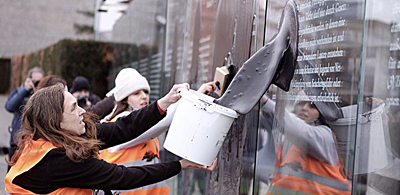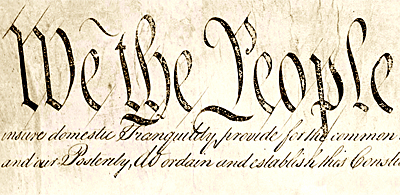Eco-Vandals Attack German Constitution Monument
On March 4, 2023, six eco-extremists from Die Letzte Generation (The Last Generation), attacked the monument to the German constitution that sits just outside of the Bundestag, Germany’s parliament. The story went largely unreported by the US corporate media.
The radicals raided the Grundgesetz 49 (Basic Law 49) art installation located in front of the parliament building that is known as the Jakob Kaiser Haus (Jakob Kaiser House). The Constitution of the Federal Republic of Germany was adopted in 1949 and is referred to as the “Basic Law.”
Video posted on Twitter by Die Letzte Generation
The Letzte Generation vandals assailed the installation-monument with what they said was petroleum. The six hurled buckets full of thick black sludge all over the transparent glass wall, then used large brushes to slop the muck over the text of the German Constitution that is etched into the glass—completely covering the words. When the monument wall was covered in the blackened ooze, the hooligans adhered posters to the glop that read: “Oil or Fundamental Rights?”
Letzte Generation released a statement to justify their destructiveness:
“Berlin: Monument of fundamental rights soaked in petroleum. The artwork near the Bundestag building shows the articles of the Basic Law. Today we showed how the government deals with these. Burn oil or protect fundamental rights? In 2023 only one of the two is possible. The burning of oil leads us to climate hell. In climate hell there is no human dignity, no freedom and no right to life. The federal government does not protect our fundamental rights.”
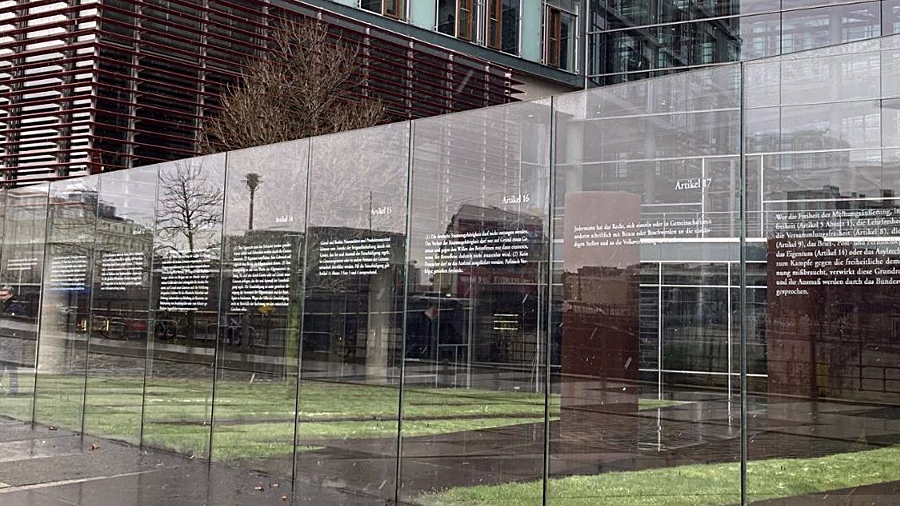
The Grundgesetz 49 installation-monument was created by Israeli artist Dani Karavan between the years 1997 to 2002. The monument consists of 19 separate panes of thick glass that stand nearly 10 feet tall. Linked together as a wall, the glass surfaces are laser engraved with the words contained in the 19 basic human and civil rights found in the Constitution of the Federal Republic of Germany. The installation was unveiled and dedicated in 2002.
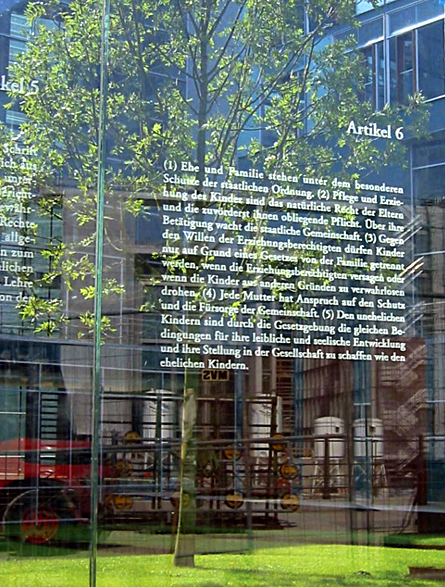
The laser engraved words float at eye level on the heavy glass; Dani Karavan’s intention was to link the words of the constitution etched on transparent glass, to the political transparency of the Parliament with its dedication to democracy.
Dani Karavan was born in Tel Aviv, Israel in 1930. He began studying art at the age of 14, and in 1956 traveled to Florence, Italy to study fresco mural painting. He later traveled to Paris, France to study at the Académie de la Grande Chaumière. In 1963 he designed the Monument to the Negev Brigade, which was dedicated to the Israeli soldiers who died in the 1948 Arab Israeli War. Integrated into the desert landscape the monument was completed in 1968 and is considered a forerunner to the so-called “Land Art” movement.
In 1964 Karavan received a commission to create a sculpture for the Israeli Knesset (Parliament). Completed in 1966 his Pray for the Peace of Jerusalem sculpture is carved from limestone blocks and set into a wall of the Knesset assembly hall. Karavan created Land Art public sculptures all around the world, and also exhibited in numerous international exhibitions.
The Jakob Kaiser Haus provides 2000 offices, workspaces, meeting rooms, and a press center for parliamentarians. The building is actually a complex of eight different structures—one of which is the old Reichstag President’s Palace.
Jakob Kaiser (1888-1961), was a leader of the Christian labor union movement, and belonged to the right-leaning Centre Party during the Weimar Republic. He resisted the Nazis, who abolished all unions except for the German Labor Front, which was controlled by Hitler’s National Socialist regime. Suspecting Kaiser of treasonous behavior, the Gestapo arrested him in 1938, but he was shortly released. After the failed assassination of Hitler on July 20, 1944, Kaiser went underground to avoid being killed by the Nazis. When WW2 ended he eventually joined the center-right Christian Democratic Union (CDU) in West Berlin.
There is another part of this story that Germans find upsetting. The Grundgesetz 49 monument faces the Spree river that passes through the center of the capital. During the Cold War the river separated communist East Berlin from democratic West Berlin. Starting in 1961 the Marxist regime of East Germany issued commands that military police should shoot all those who attempted to climb over the Berlin Wall, or swim across the Spree in escaping to West Germany.
On Aug. 24, 1961, twenty-four-year-old Günter Litfin tried to swim the Spree to the West. Before he could reach the shore the East German police shot and killed him with rifle fire. He was the first to be killed by the reds for crossing the East German border… he wouldn’t be the last, some 200 Germans were killed. Letzte Generation vandalizing the Grundgesetz 49 monument seemed a desecration to the memory of those who sacrificed everything to be free.
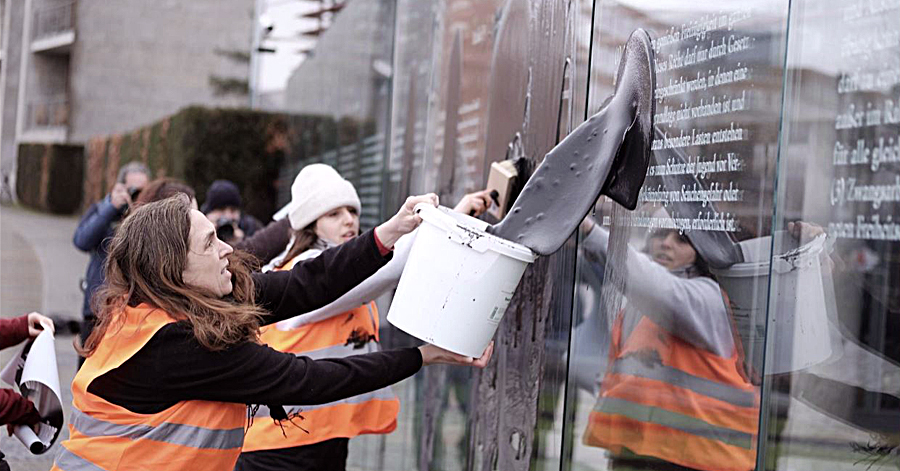
Ultimately the Berlin police detained but did not arrest the six Letzte Generation vandals; their personal details were recorded and they were banned from the Bundestag area.
A police spokeswoman said that several criminal charges had been filed—but the charges are unknown. One wonders why the vandals were not simply tossed into the hoosegow.
The police also analyzed the “petroleum” used to slather the monument, and found that it was wallpaper glue mixed with black pigment. Be that as it may, Last Generation are still lunatics.
Last Generation’s assault was directed against Germany’s use of fossil fuels. Before the Russian invasion of Ukraine, the German government began to shut down the country’s energy industry for environmental reasons—coal and nuclear power plants were being phased out. However, renewable energy sources were not sufficient enough to fill the gap. Then came the Ukraine war.
At present, solar, wind power, and other renewable resources cannot possibly meet Germany’s tremendous energy needs. As energy costs skyrocket, Germans are going without heat this winter. People are cutting back on hot showers, and many cannot afford to cook with gas.
Unbelievably, the German people are now relying on firewood to replace natural gas. These are the new dark ages—ban petroleum and natural gas, then turn to deforestation to stay warm. Nonetheless, the eco-zealots of Letzte Generation continue to demand, “no new gas or oil!”
It is difficult to convey the shock Germans felt regarding the attack on the Grundgesetz 49 monument. An equivalent would be US environmentalists entering the Rotunda for the Charters of Freedom located in the National Archives Building in Washington, DC, and pouring “petroleum” over the display case holding the original copy of the US Constitution. I realize that these days some Americans would not be upset at such a vile act, but I am not one of them.
The malicious vandalism committed by Last Generation expressed utter contempt for Germany’s Constitution, and that offense has not gone unchallenged. There has been a tremendous wave of outrage aimed at Last Generation’s violation of the Grundgesetz 49 monument; disdain that leaps across the political spectrum, it even arises from environmentalist supporters.
The member of Parliament for the environmentalist Greens, Konstantin von Notz, described the vandalism as a “shitty action.” Konstantin Kuhle, deputy chair of the liberal Free Democratic Party (FDP), said: “If this rate of radicalization continues, sooner or later the ‘Last Generation’ will have to be observed by the Office for the Protection of the Constitution.” He noted that environmentalists as a whole must distance themselves “from such extremist tendencies.”
Marco Buschmann of the FDP said: “The Basic Law stands for freedom, democracy and the rule of law. That should never be dragged in the dirt for nothing!” Martin Hagen, chairman of the FDP in Bavaria, said: “The Last Generation besmirched our Basic Law.” Frank Müller-Rosentritt of the FDP made a word play of the “Last Generation” moniker… he simply Tweeted: “Last Scum.”
Bundestag President Bärbel Bas of the center-left Social Democratic Party (SPD), said: “The news of today’s protest action near the German Bundestag really shook me. A work of art with our constitution was daubed. That outrages me and I have absolutely no understanding of it.”
Katja Mast of the SPD, aimed her comments at Last Generation: “Celebrating yourself for trampling on our values, I don’t understand that at all.” MP Michael Roth of the SPD and chairman of the Bundestag’s Foreign Affairs Committee, compared Last Generation to the Taliban, condemning their vandalism as a “cheap, undignified action.” He went on to address them directly: “You shit on basic rights, destroy art like the Taliban, and still feel like heroes!”
Nancy Faeser of the SPD, who also serves as the Minister of the Interior in Chancellor Olaf Scholz’s cabinet, criticized the vandals by saying: “There is no justification for smearing fundamental rights of all things—and in the Bundestag, the heart of our democracy! This shows that these people only have chaos on their mind. This completely unworthy action must now be consistently prosecuted.”
Alexander Throm of the center-right Christian Democratic Union (CDU), said: “The fact that the climate activists don’t believe in law and order has long been shown. Now they have also made it clear that they disregard our Basic Law. The federal government must finally act here and tighten the penalties for these crimes.”
Florian Hahn of the conservative Christian Social Union (CSU) also compared Last Generation to the Taliban, saying: “The Last Generation is not one bit better than the Taliban.” Ilse Aigner of the CSU said: “Anyone who smears the Basic Law is incapable of democracy and harms themselves.”
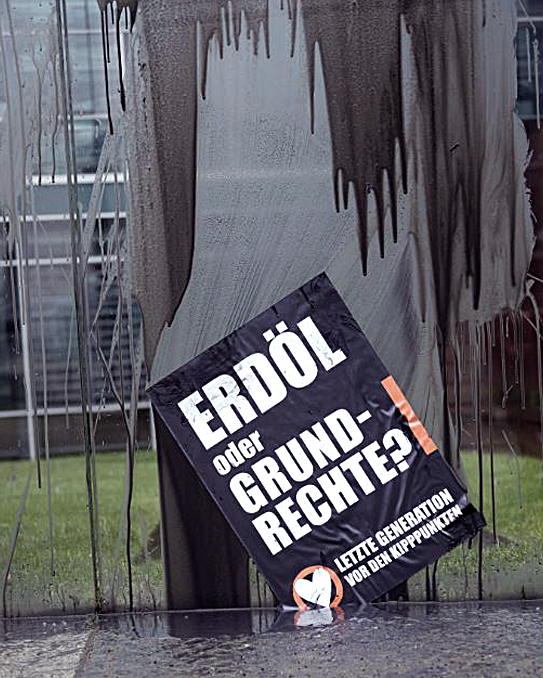
While the militants of Letzte Generation pursue their pipedreams of eco-utopia brought about by their war on art, a real war they are apparently oblivious to is being waged in Ukraine. Contrary to expectation those in the German Bundestag who condemn the eco-vandals, continue to mobilize for the proxy war with Russia, which only exacerbates the energy crisis in Germany (and the rest of the world for that matter).
It is foolish to deny that control of the world’s energy resources is part of that war—no one is fighting to monopolize solar power. Just analyze the disturbing tale of the Nord Stream pipelines.
All of the above is just part of the “fog of war” you have heard about so often; the Germans call it “Nebel des Krieges.” Currently that phrase flawlessly describes the doubt, uncertainty, and confusion of those state actors (US, EU, NATO) who organize to intervene in the territorial dispute between Russia and Ukraine… and one false move leads to nuclear Armageddon.


